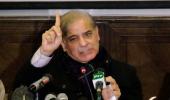Senator Anwarul Haq Kakar from Pakistan's restive Balochistan province was on Saturday appointed the caretaker prime minister to head a neutral political set-up to run the cash-strapped country until the next general elections.

Kakar's name was agreed upon during the final day of consultations between outgoing Prime Minister Shehbaz Sharif and the Leader of Opposition in the dissolved National Assembly, Raja Riaz Ahmad, according to a statement from the Prime Minister's Office.
'The prime minister and leader of the opposition jointly signed the advice (to appoint Kakar) and it was sent to the president,' read the Prime Minister's Office (PMO) statement.
Kakar, 52, is an ethnic Pushtun from Balochistan and a member of the Balochistan Awami Party (BAP) -- a party considered close to the powerful establishment of the country.
The first-time Senator is expected to be sworn in on Sunday as the caretaker prime minister.
In his first reaction, Kakar tweeted: Thank you to Allah Almighty who gives me the opportunity to Serve the Nation as Caretaker PM of Pakistan.
I.A (inshallah) will do the best which will be in favour of Pakistan.
Speaking to the media, Opposition leader Riaz said: "We decided that the interim prime minister would be from a smaller province".
He said that Kakar's name was suggested by him which was approved.
President Arif Alvi approved the appointment of Kakar as the caretaker prime minister under Article 224(1A) of the Constitution.
Sharif also thanked Riaz for his cooperation during the consultation process and for his excellent leadership of the opposition during the past 16 months.
Former information minister Marriyum Aurangzeb also confirmed that Kakar emerged as a consensus candidate during a discussion between the prime minister and the opposition leader.
The premier and opposition parties began rounds of meetings to pick a caretaker prime minister following the dissolution of the National Assembly on August 9.
Under Provision of Article 224 (1A) of the Constitution, the president appoints the caretaker prime minister in consultation with the prime minister and leader of the opposition in the outgoing National Assembly, the lower house of Parliament.
Kakar was elected to the Senate in 2018 and has been a very active politician.
He has also served as the spokesperson of the Balochistan provincial government prior to his election to the upper house.
Born in 1971 in the Muslim Bagh area of Qila Saifullah district of Balochistan.
He holds a Master's degree in Political Science, Sociology and is an alumnus of the University of Balochistan.
The appointment of an interim government is a constitutional requirement and the outgoing prime minister is bound to choose his successor in consultation with the leader of the opposition within three days of the end of the National Assembly.
If the two leaders fail to reach a consensus, they send two names each to a bipartisan parliamentary panel which creates consensus on a single candidate within the next three days.
However, in case of failure, the panel sends all names to the election commission which within two days appoints the caretaker premier.
The national assembly was dissolved on August 9 and Saturday was the last day for the prime minister and the leader of the opposition to agree upon a caretaker premier.
The general elections are expected to be held within 90 days but the election commission may take more time if it organises delimitation on the basis of a new census. Kakar will soon take an oath and choose his cabinet for the interim period to run the country.
The political parties part of the Pakistan Democratic Movement (PDM) alliance had emphasised the need for the continuation of economic policies during the transition of power and projects initiated by outgoing Prime Minister Sharif to stabilise the economy.
Kakar will assume charge when Pakistan is facing its worst economic crisis since independence in 1947.
Pakistan's economy, which was already struggling due to financial mismanagement and political uncertainty, has been pushed to the brink by a global energy crisis and devastating floods that hit the country last year.
He will have to implement the tough conditions set by the International Monetary Fund when it approved a USD 3 billion staff-level bailout agreement with Pakistan in June.










